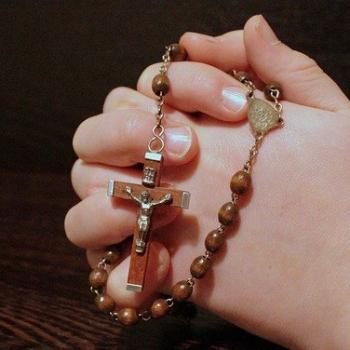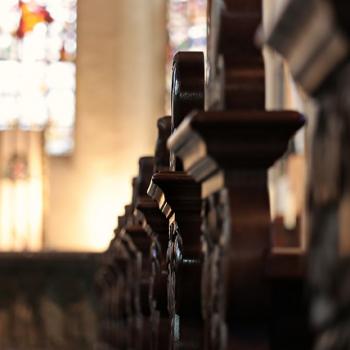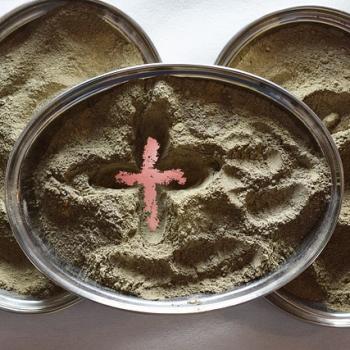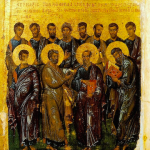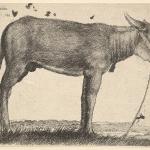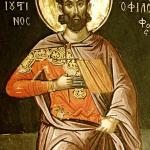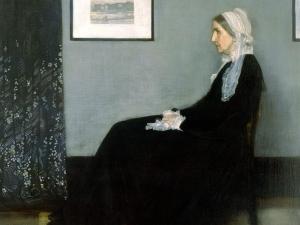
I am informed that I must not critique a piece of writing written by Professor Anthony Esolen, because he is a “good man and a fellow Christian.” I am also informed that it’s disrespectful to refer to Professor Anthony Esolen as Anthony Esolen, and I certainly mustn’t call him “Tony.” His title is “Doctor,” I’m told in the combox, and the only reason that the good Doctor has not corrected me himself is that I’m a nobody. Very well.
Doctor Tony Esolen has written a new piece on young people and homosexual attraction, for Crisis magazine. I hesitate to even link to it, because it’s squickier than the first one, but I do want to comment on one curious piece of advice he gives his readers. The entire piece is addressed to a hypothetical teenage boy who finds himself aroused by other boys in the locker room; Doctor Tony refers to him as “young man” and has counsel that ranges from run-of-the-mill to astonishing– who knew that teenage boys are sexually aroused by dogs? But there is one apothgem he keeps on going back to, which is also the title of the article: “Talk to your father.”
Doctor Esolen is adamant that boys ought never to go to a therapist if they have homosexual feelings. A female therapist couldn’t possibly understand being attracted to males, and a male therapist will be too taken in by the sinful ways of the world to provide good counsel. Only a parent can understand and provide the advice that will keep his son on the straight and narrow. Boys should go to their fathers for a frank talk whenever they have a sexual feeling. “You may be astounded by the old man’s wisdom.”
What an intriguing assumption.
When I was a teenager, I went to my mother; I assume that Doctor Esolen would counsel girls to talk to their mothers anyway. His article hints at more to come, so perhaps he’ll have a girls’ version of the article he wrote this week– though, in my experience, people in the Crisis magazine crowd tend to have a hard time believing women have sexual urges of any kind. In any case, I went to my mother with my questions. She told me not to ask anybody else about sex– not to talk to my friends or my friends’ mothers, only to her.
My mother was homophobic, as was everyone in the extremely insular conservative homeschooling culture that raised me. It’s the kind of culture Doctor Esolen would surely approve of, if his piece I critiqued last week is any indication. By “homophobic,” I do not mean “faithful to Catholic teaching, believing that sexuality is ordered to the conjugal love of man and woman.” I mean, everyone in that culture was afraid of gay people. Somehow we were never taught the part of the Catechism of the Catholic Church that states that such people ” must be accepted with respect, compassion, and sensitivity.” Consciously or unconsciously, we all gauged our faithfulness to Church teaching in part by how much we feared gay people. Gay people were to be feared when they drew attention to their sexuality and feared more if they minded their own business and talked about something else. All of us children in the homeschool group were taught that gay people were sick; that they had no self-control, that they were really pedophiles and worse. My mother informed me with absolute conviction that AIDS had crossed the species barrier in the 1980s when a homosexual man raped a chimpanzee.
Of course, this meant I was terrified that I was a lesbian– not because I was, but because it’s impossible to be taught to fear anything that much and not develop a terror that you’ll turn into it. If I was raised to think that cockroaches were the supreme enemy of the Church and the Family, I would probably have grown up afraid of waking up one morning to find myself changed in my bed into a monstrous vermin. As it was, I was afraid of being a lesbian. I saw everything as confirmation of what I feared. When my mother suggested that certain teenage boys my age were handsome, and would make good husbands, I invariably disagreed with her tastes– and feared that this was because I was a lesbian. When my mother laid out my skirt to wear to Mass, I would complain that I hated skirts and wanted to wear trousers– and feared that that was because I was a lesbian. When I went to a fast food restaurant with a group of friends from the homeschool group, the boys would order enormous cheeseburgers with all the trimmings, and the girls would eat more modest fare. I would sit with my side salad and plain single burger, casting envious looks at the boys’ table.
“Can you imagine being a boy,” one of my friends would say with disgust, “And eating a triple cheeseburger with french fries and a large Coke?”
I could imagine it. I wished I was a boy so I wouldn’t be expected to feign enjoyment of iceberg lettuce. I feared that this was because I was a lesbian.
One evening, I went and told my mother.
I knew I couldn’t say the word “lesbian;” it was a bad word that would shock her, like “gay.” So I said, “I think I’m homosexual.”
“You’re not,” said my mother. “Because if you were, I would kill you and put us both out of our misery.”
I never brought up the subject again.
I’m told I’m not allowed to say anything in criticism of a good man and a fellow Christian. But perhaps Doctor Tony hasn’t thought his advice through.
(image: An Arrangement in Grey and Black: The Artist’s Mother, by James Abbot McNeill Whistler, in the public domain.)








